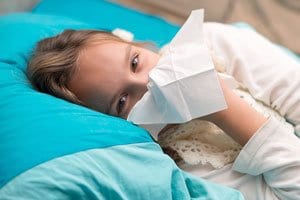Use caution when fighting coughs and colds
Denise Lenarz, MD, Pediatrician
CentraCare Clinic - Health Plaza Pediatrics
 One of the most common questions I hear is “Is it OK to give my child cough and cold medicine?” The short answer is no.
One of the most common questions I hear is “Is it OK to give my child cough and cold medicine?” The short answer is no.
Over-the-counter (OTC) cough and cold medicines are intended to treat the symptoms of coughs and colds — not the virus that is causing the symptoms. OTC cough and cold products may contain a decongestant, antihistamine or pain relievers, which can cause serious side effects including fatal overdoses in young children.
Avoid antibiotics
If your child has a cold, antibiotics won’t help. Antibiotics fight bacterial infections but do not work on viruses such as colds. Overusing antibiotics increases the chances of getting an antibiotic-resistant infection in the future.
Treat a cold
An over-the-counter pain reliever — such as acetaminophen (Tylenol) or ibuprofen (Advil and Motrin) — can reduce a fever and ease the pain of a sore throat. These will help keep your child comfortable.
Follow the dosing guidelines carefully. For children younger than 3-months-old, do NOT give acetaminophen until your baby has been seen by a doctor. Do NOT give ibuprofen to a child younger than 6 months old or to children who are vomiting constantly or are dehydrated. Also, products containing Aspirin should only be given when directed by your child's provider.
Comfort measures
- Liquids such as water, juice and broth. Warm liquids, such as tea or chicken soup, might help loosen respiratory secretions.
- Run a cool-mist humidifier.
- Use a suction bulb for a baby or young child to draw mucus out of the nose.
- Over-the-counter saline can keep nasal passage moist. For younger children, use saline nasal drops. For older children, use a saline nasal spray or saline nasal irrigation.
- Ice cream, frozen fruit pops, ice or cold beverages might feel good on a sore throat.
- For children age 6 years and older, gargling salt water might soothe throat pain.
- Do NOT give hard candy or medicated lozenges to young children.
Prevent colds
- Teach your child to wash his or her hands often and thoroughly (long enough to sing the ABCs twice). Use an alcohol-based hand sanitizer or hand wipes if soap and water are not available. Disinfect toys and household surfaces.
- Teach your child to cough or sneeze into the crook of the arm. Even better — use a tissue and throw it away.
- Avoid close contact with anyone who has a cold.